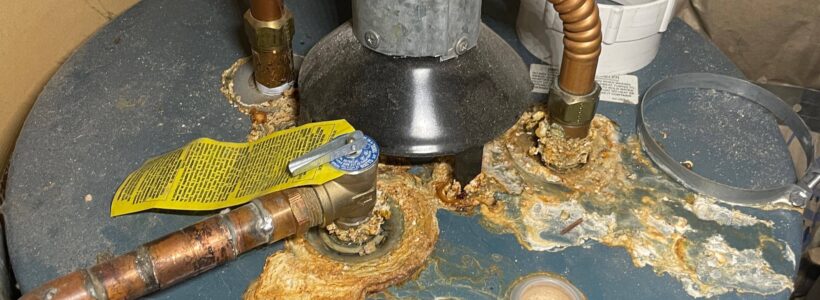Repair or replace – guide to water heaters
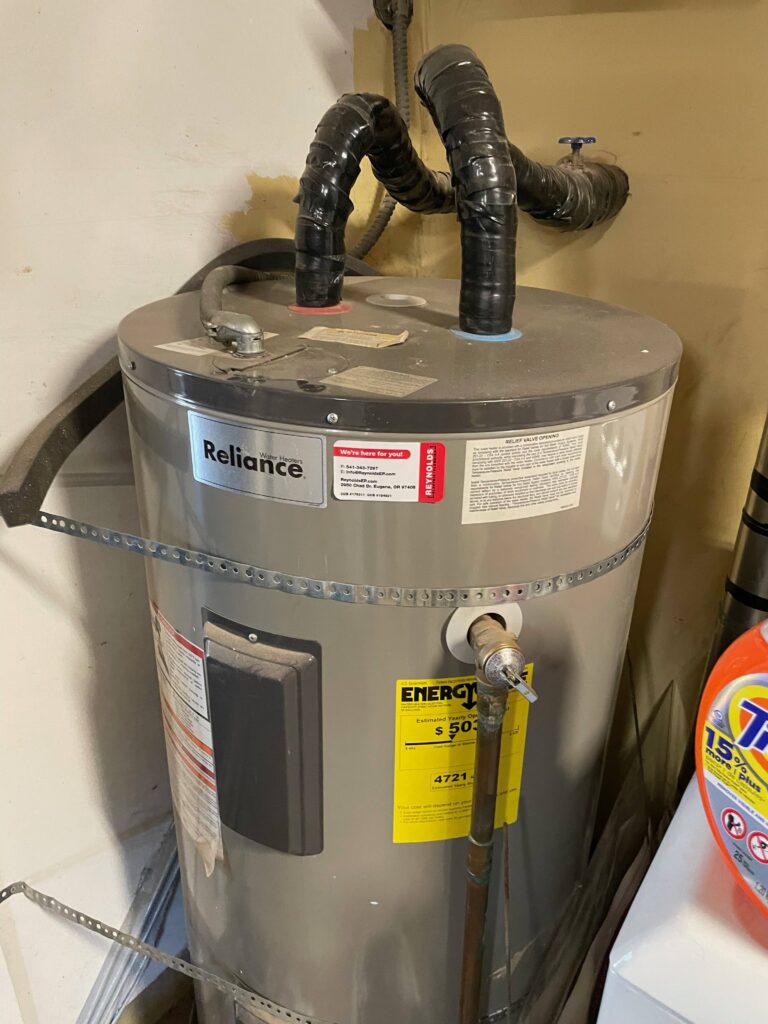
When should I consider replacing my water heater?
Generally speaking, water heaters have a life expectancy of 10-15 years. This timeline can vary depending on the type of heater you have and how well it’s been maintained over the years. If your unit is more than 10 years old, it’s likely time to replace the water heater.
There are also some warning signs that could indicate it’s time to replace your water heater.
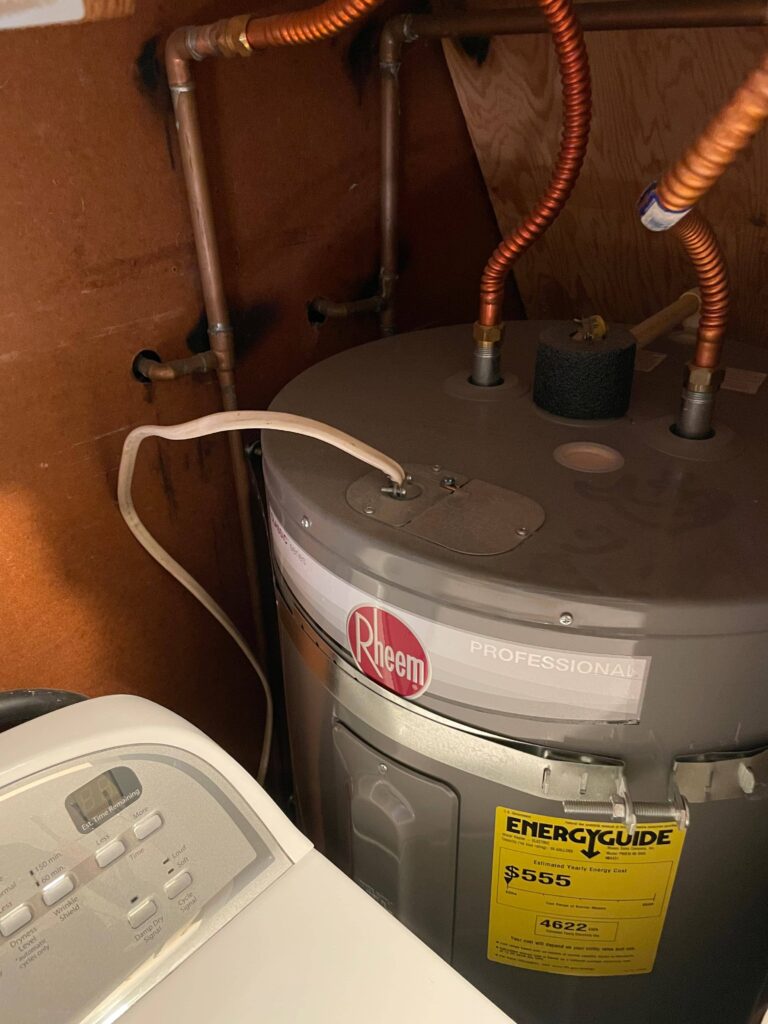
- You only get cold water from your existing water heater or the pilot light doesn’t stay lit.
- You only get warm water or there is trouble heating water till it’s hot.
- Your water quality is degraded when using hot water.
How long should hot water heaters last?
A typical hot water heater should last 8-12 years. Tankless water heaters can last up to 20 years with proper maintenance. If your unit is more than 10 years old from the manufacturing date (You can find this with the serial number on the tank), it’s likely time to consider a replacement.
If you’re looking to replace a water heater, there are many factors to consider but most homeowners look at:
• Cost: The cost of installation and the price of the new unit will be major factors in deciding whether or not to replace your water heater.
• Size/capacity: Make sure that the size and capacity of the new unit meets your household needs. Smaller units may save money on energy costs, while larger models may provide more hot water for multiple uses and larger families. Usually a replacement of the same type is sufficient.
• Energy efficiency: Look for water heaters that are Energy Star certified, as these units are more energy efficient and can save you money on your utility bills. They have different heating functions for some of these efficient heaters
What are the signs my water heater is failing or may need significant repair?
There are several signs that your water heater may need to be replaced or repaired. These include:
• Rusty or discolored water: This could indicate rust or sediment buildup in the tank, which could lead to leaks and other problems.
• Leaks: If you notice water pooling around the base of your unit, this is a sure sign that your water heater isn’t just failing but has failed completely.
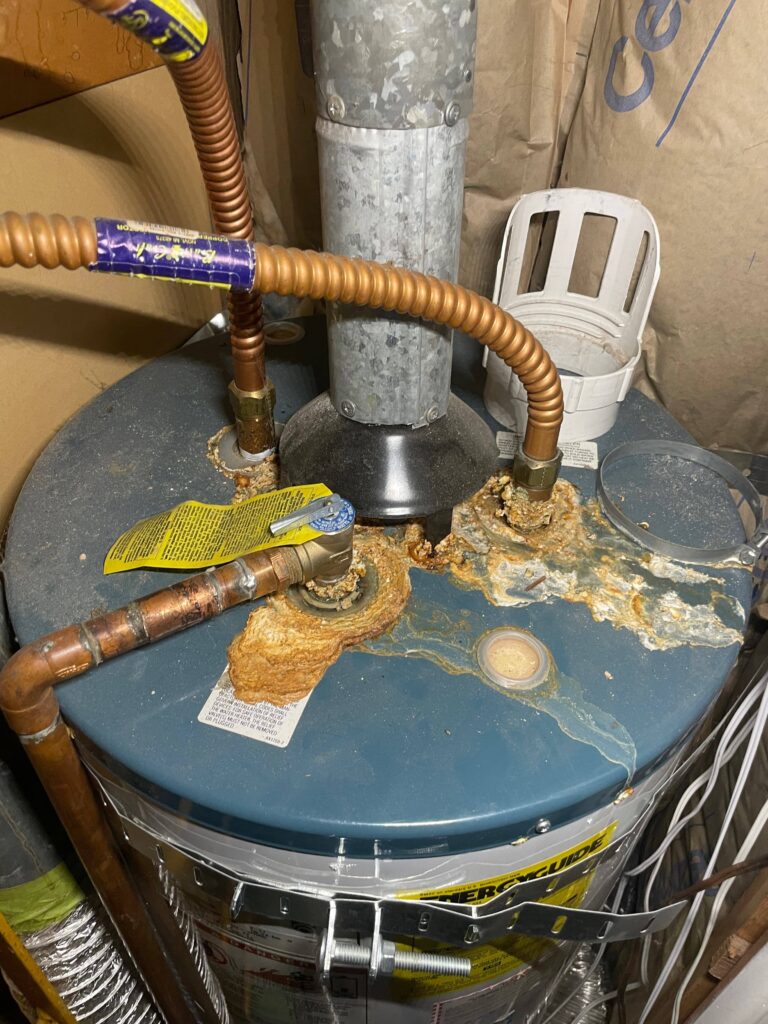
Water Heaters Leaking
A leaking water heater is a sure sign that the unit has failed and needs to be replaced. This could be caused by rust, corrosion, or other problems with the tank or fittings. If you’re getting cold water sooner than you’re used or the recovery rate isn’t the same it could be a sign that your water heater or water line is leaking.
Depending on location, a leaking water heater could cause significant property damage. The tank capacity and amount of running water, can make water damage one of the most devastating accidents that an average person or househould could experience.
What to look for when your hot water heater is about to fail
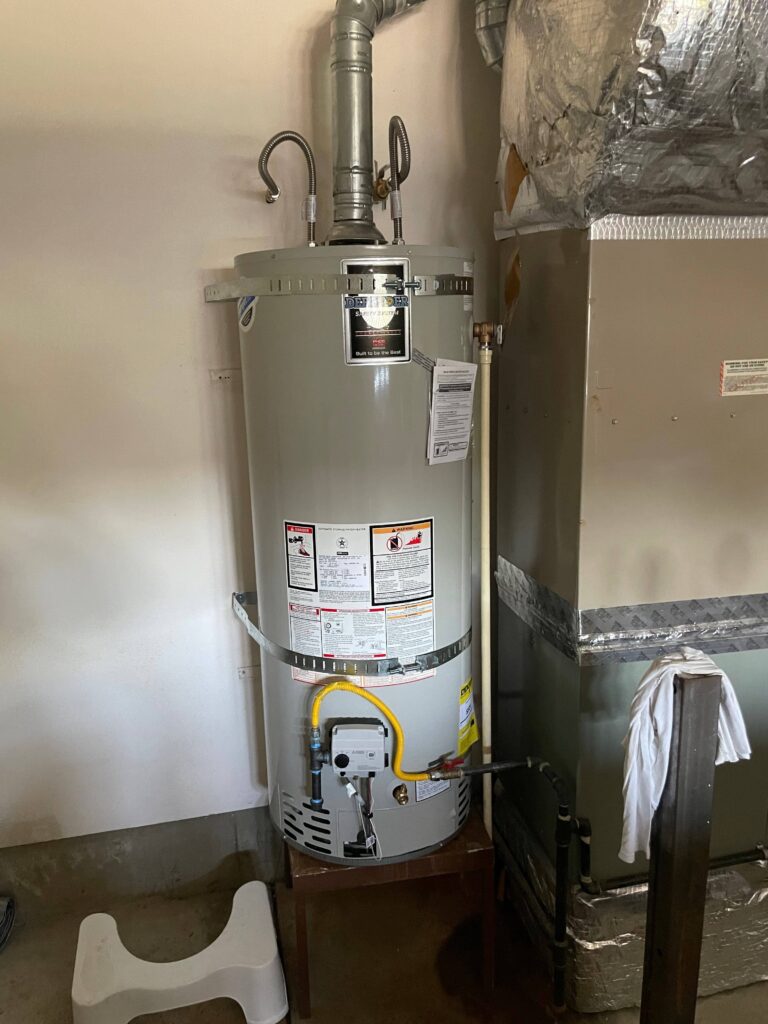
It’s important to look out for signs that your water heater is failing. These can include:
• No hot water: If you’ve noticed a drop in the amount of hot water your water heater provides, this could be an indication that it’s about to fail.
• Loud rumbling noises or vibrations: These usually indicate wear and poor operation. Not present when working properly
• Strange smells, hard water, or discoloration: Rust, sediment, corrosion, and mineral buildup can cause strange odors and discoloration in your water. This could indicate a serious problem and should be addressed by a professional.
• Water pressure changes: If you’ve noticed that the water pressure is too low or too high, this could be an indication.
Rusty Water Heater Inlet Valve
Rusty water, pipes or an inlet valve that is not functioning properly could be a sign of a failing water heater. This could be caused by corrosion, sediment, or mineral buildup in the tank and should be looked at by a professional as soon as possible.
If you suspect that hot water heater repair or that it’s time to replace your water heater, it’s important to contact a professional for an inspection. They will be able to determine the exact cause of the problem and advise you on how best to proceed with repairs or replacement. Taking care of the issue early can help prevent further damage and costly repairs in the future.
Water Heater Maintenance
Regular maintenance is the best way to ensure your water heater lasts. This includes flushing the tank on a regular basis, checking for any signs of corrosion or wear, and changing out the sacrificial anode rod every three to five years (depending on the type of water heater). Additionally, you should inspect all piping leading into and out of your unit as well as check for leaks regularly. By taking these steps, you can help maintain your water heater and avoid costly repairs in the future.
By following this advice and staying alert to any potential issues with your hot water heater, you can keep it running safely and efficiently for many years. If you suspect that something is wrong with your unit, don’t hesitate to contact a qualified professional for an inspection and repair.
Should I Repair or Replace My Hot Water Heater?
The decision to repair or replace your water heater should be based on the age of the unit, its condition, and the estimated cost of repairs. If your unit is more than 10 years old, it may be time to consider replacing it with a newer model. Is it an electric water heater or a gas water heater? On the other hand, if the water heater tank is in good condition and only needs a minor repair, then it may be more cost effective to have the issue fixed. Ultimately, it’s up to you to weigh the costs and benefits of each option and decide which is best for your situation.
No matter what you decide, always choose a qualified professional to perform any repairs or replacements. When your water heater reaches its end of life a licensed technician will have the experience and expertise to properly diagnose your issue and provide the correct solution. This will help ensure that your water heater is running efficiently and safely for years to come.
How Do you Know Your Water Heater Needs Replacement?
There are a few signs that may indicate it’s time to replace your hot water heater. If you notice rust or corrosion on the outside of the tank, this could be an indication that there is a problem with the interior of the tank that needs to be addressed. Additionally, if you find yourself frequently running out of hot water or hearing strange noises coming from the unit, then it may be time for a replacement. Finally, if your energy bills have begun to rise due to inefficient operation of the unit, then it could also signal that you need a new one.
As always, contact a qualified technician when in doubt and they can help you determine whether repairs or replacement is necessary and advise you on what type of unit might be best for your home. By taking preventative measures and recognizing signs of trouble, you can ensure that your hot water heater is in top working condition.
Cost for a Water Heater
Replacement
The cost of a hot water heater replacement can vary greatly depending on the type and size of unit you need. Generally, tankless units are more expensive than traditional storage tanks due to their higher efficiency ratings. Additionally, you may be able to save money by purchasing a unit that is Energy Star rated, as these models tend to use less energy and have lower operating costs over time.
In most cases, it’s best to get professional help when selecting a new water heater and replacing an old one. Licensed technicians will be able to provide advice on the best type of unit for your home, as well as assist with installation and any necessary repairs or replacements.
Factors to Consider When Shopping for a Hot Water Heater
Replacement options
Before you purchase a new hot water heater, it’s important to consider several factors. First, you should determine the size of unit that will best suit your needs. This could depend on the number of people living in your home and their individual water usage habits. You should also consider whether a tankless or traditional storage tank model is right for you. Tankless units are more energy efficient but can be more expensive upfront, while traditional tanks may have lower installation costs but higher operating costs over time. Finally, make sure to look into any rebates or incentives available from local governments or utility companies that could help offset the cost of your new unit.
By taking these steps and talking with an experienced technician, you can find the right info on when to replace water heater.
Why should I consider upgrading to an ENERGY STAR certified electric heat pump water heater?
Installing an ENERGY STAR certified electric heat pump water heater can save you up to 60% on your water heating costs. It is also more efficient than a traditional storage tank model, making it better for the environment. Additionally, this type of unit does not produce greenhouse gas emissions and often qualifies for rebates or other incentives from local
Tankless Water Heater vs Conventional Water Heater
Tankless water heaters are becoming an increasingly popular choice for homeowners, as they can be more efficient and have a longer lifespan than conventional units. Tankless models heat water on demand, so you only use energy when hot water is needed. This can lead to significant savings over time. They also take up less space since there is no bulky tank.
Tankless Water Heaters
However, tankless water heaters can be more expensive upfront and require professional installation, which adds to the cost. They also require regular maintenance in order to keep them running efficiently.
Tank Water Heaters
A conventional water heater is generally less expensive than tankless models and have lower operating costs over time. These units use a storage tank to hold heated water
Removal and Disposal of an Old Water Heater
Before you install a new water heater, you need to properly dispose of the old one. Depending on your local regulations, you may need to hire a professional for the removal and disposal process. Properly disposing of an old water heater is important to ensure that hazardous materials and chemicals don’t contaminate the environment.
Gas vs Electric Water Heater: Which is Best?
When it comes to selecting a new water heater, you have two main choices: gas or electric. The type of system that is best for you will largely depend on the availability of fuel sources in your area and the cost of energy in your region. A gas water heater may be more efficient and less costly in some areas, while electric is more common and widely available
Gas Water Heaters
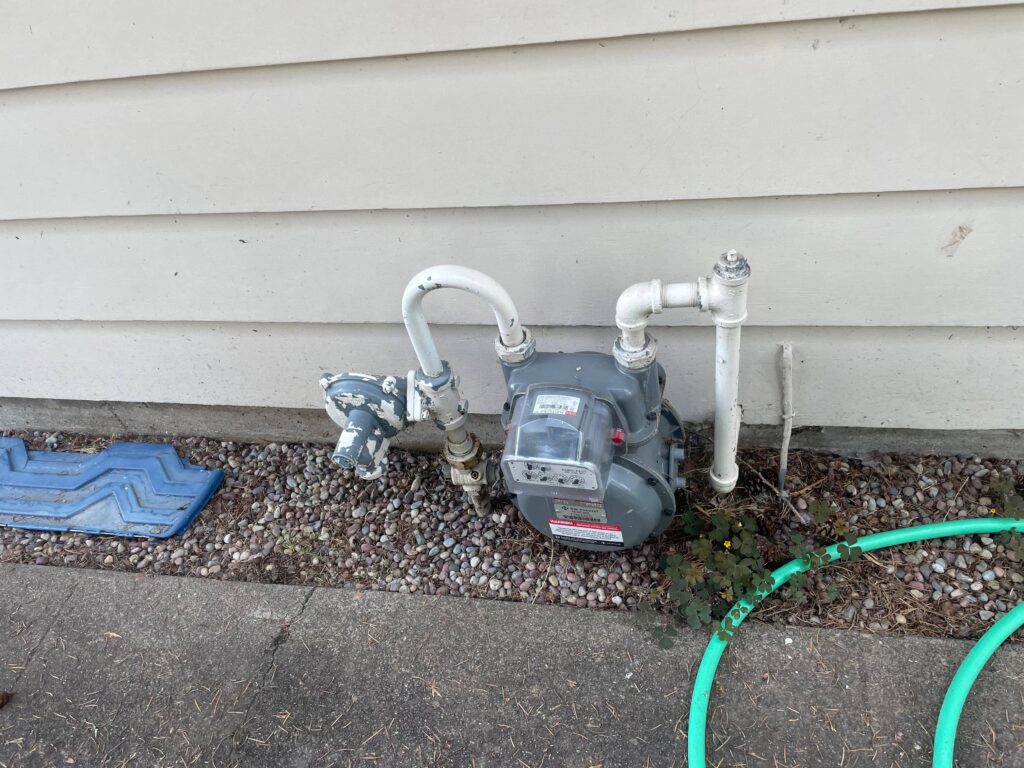
Gas water heaters will use natural gas or propane to power the burner and heat the water. They are generally more energy efficient than electric models. Gas powered devices will require a gas supply, water supply, pressure relief valve, tank and thermostat when working properly. They can have multiple parts that can be replaced.
Electric Water Heater
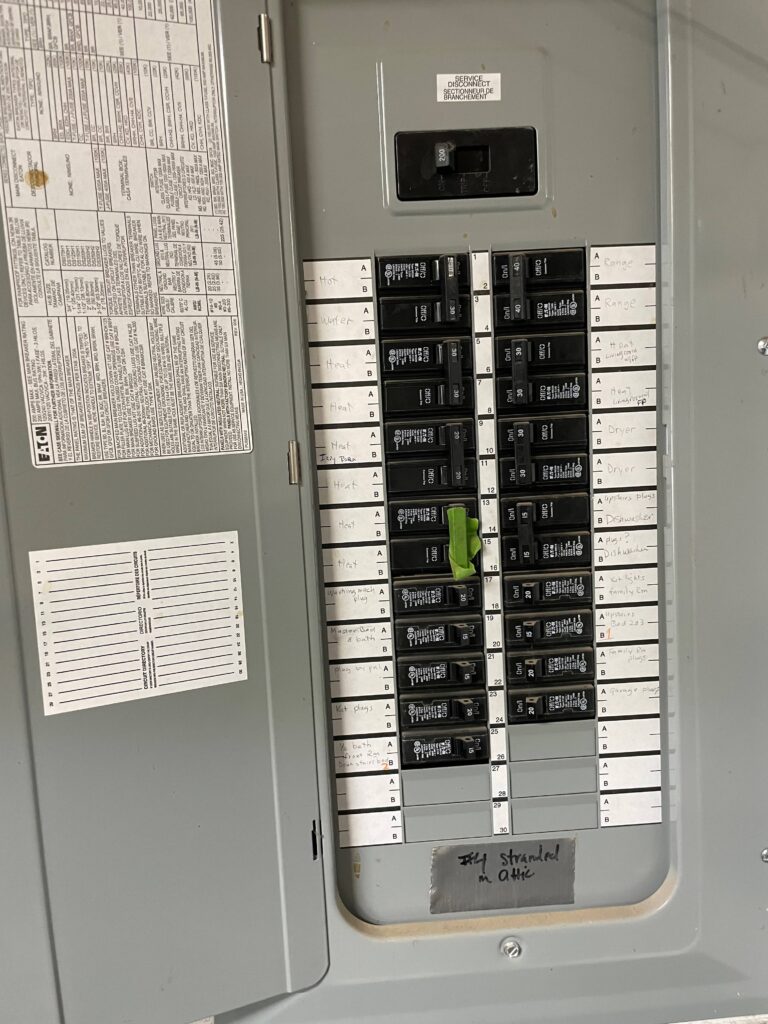
An electric water heater uses electric resistance coils or heating elements to heat the water. They are generally less expensive upfront and can provide quick access to hot water. A broken heating element is tied to an electrical thermostat for all electric water heaters and are used for the heating cycle. A heating element can be replaced on electric water heaters.
Cost of Replacing a Hot Water Heaters
This is going to be largely dependant on your ability to DIY and or your desire to hire a plumber to have to work done for you. The plumber will always be more expensive, efficient, and higher quality while the DIY route will be more budget friendly

